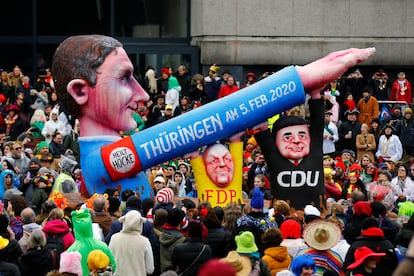Success of far-right AfD party reveals cracks in Germany’s democratic firewall
After the Christian Democrats voted with the extremist party in the eastern state of Thuringia, it appears that the normalization of the Alternative for Germany group is gaining ground


A small political earthquake swept through Germany last week. The Christian Democratic Union (CDU) managed to push a bill through the state parliament in Thuringia, with the votes of the far-right Alternative for Germany (AfD).
It was a simple vote to lower a tax: it didn’t involve a major legislative change, nor an agreement to form a coalition government. Nevertheless, it represented the breaking of a political taboo — a breach in the convention by which the German extreme-right must be banned from any space in public life. It was, in short, a shakeup of the cordon sanitaire against the AfD that, until recently, remained firm. The episode in the state of Thuringia — which occurs at a moment when the far-right is leading the polls in the east of the country —reveals that the normalization of the far-right is gaining ground.
The national leader of the conservative CDU, Friedrich Merz, categorically assures the public that there is no such gap in the firewall against the far-right. He affirms that his party unwaveringly maintains the prohibition of cooperating in any way with the AfD. Meanwhile, Mario Voigt — the leader of the CDU in the State Parliament of Thuringia — defended his political bloc, stating that his party isn’t to blame for presenting a good law that garners the support of other parties, no matter how unpleasant those parties may be. “We cannot make the solution to problems subject to the wrong side supporting the solution,” Merz said, before the controversial vote.
However, this move by the CDU comes in the middle of a long internal debate regarding cooperation with the AfD. Merz himself added gasoline to the fire a few months ago, by specifically suggesting collaboration with the ultra-right party at the municipal level. After the AfD won its first mayoralty and its first rural district government — the latter precisely in Thuringia — Merz called for pragmatism in dealing with the party. However, the very next day, he was forced to rectify his words after a barrage of criticism. Still, his words left a mark that has been interpreted as an openness to a change in policy. The recent controversial vote in Thuringia has only served to confirm this.
While Merz has attempted to downplay what occurred in the state legislature, voices in his party have questioned the joint vote, which also had the support of the liberals from the FDP — a party that has partnered with social democrat Chancellor Olaf Scholz and the Greens at the federal level.
The minister-president of the northern German state of Schleswig-Holstein — Daniel Günther, of the CDU — emphasized that his party has ruled out any type of collaboration with the AfD in its statutes. He described the vote in Thuringia as an error. The internal rules literally ensure that “Germany’s CDU rejects coalitions and similar forms of cooperation with both Die Linke [The Left, a post-communist bloc] and the Alternative for Germany.” This specific wording was approved at the CDU’s 2018 convention.
Christian Democrat Hendrik Wüst — the minster-president of North Rhine-Westphalia — hasn’t been as forceful in his condemnation, though he has pointed out that the conditions in the State Parliament of Thuringia were difficult and that the background to the vote will have to be analyzed. He also highlighted that the leader of the AfD in Thuringia, Björn Höcke, is a person who they “shouldn’t be working with at all.”
Nazi slogans
The national ultra-right party is suspected of posing a danger to democracy. The regional branch of the AfD in Thuringia is formally classified as a right-wing extremist group and, as such, is monitored by the German secret services. Its leader, Höcke, is the ideologue of the most radical wing of the party. He’s been accumulating more and more power within the AfD, and he’s also awaiting trial for the use of Nazi slogans at his rallies. The extent of his radicalism is so significant that, in 2019, a court ruled that his critics and the press could safely call him a “fascist” without fear of being sued for defamation. Christian Democrat legislator Kai Whittaker has also publicly regretted the collaboration with the AfD on his social media, even more so because it occurred in Thuringia, where the most clearly xenophobic branch of the party operates.
It is in Thuringia — and in the rest of the former East Germany — where the dilemma facing the CDU is most visible. The far-right leads the polls in four of the five eastern states — Brandenburg, Saxony, Mecklenburg-Vorpommern, and Thuringia — and regional elections are barely a year away in three of them. The AfD is benefitting from Germans’ concerns about inflation and uncertain economic prospects. In national polls, the party is now in second place, averaging at around 21% or 22% of voting intentions. This level of success raises doubts about how long the democratic firewall can stand.
The situation is troubling for the CDU. Should the party stay in the center of the political spectrum, or wage war on the issues where the extremists have an advantage? The party now finds itself having this ideological discussion, as its leadership finds it increasingly difficult to form government by having to exclude a party that holds more than 30% of the vote in some states. And, lately, another discussion has emerged, on the subject of cooperation. But prominent figures, such as Bavarian Minister-President Markus Söder — leader of the CDU’s sister party in the region, the CSU — firmly reject any type of relationship with the AfD, “even if it’s a chat over coffee.”
In the recent vote in Thuringia, the CDU can for the moment claim that there was no prior agreement, or even a conversation on the matter. The party maintains that it didn’t know whether the AfD would support the tax change. Many doubt this, especially because the legislative chamber is quite small, with only 90 deputies. It would be easy and discreet to agree on anything. However, neither the press nor the government — led by social democrat Minister-President Bodo Ramelow — have been able to demonstrate whether or not such an alliance existed.
The truth is that, at the local level, there have already been several joint votes that have allowed legislative decisions to be made. For instance, in Radebeul — a town of 34,000 inhabitants in the eastern state of Saxony — the CDU and AfD voted together to rename a square after an opera singer. The decision wasn’t particularly controversial, but the motion came about after the AfD and the CDU jointly supported it, something that, in principle, goes against the CDU’s own guidelines. This is according to the public television channel ZDF, which has looked into examples of what could be considered to be small gaps in the democratic firewall.
In the Thuringian parliament, while the proposal didn’t come from the AfD, for the far-right party’s critics, it was, in Minister-President Ramelow’s words, “a pact with the devil.”
Sign up for our weekly newsletter to get more English-language news coverage from EL PAÍS USA Edition
Tu suscripción se está usando en otro dispositivo
¿Quieres añadir otro usuario a tu suscripción?
Si continúas leyendo en este dispositivo, no se podrá leer en el otro.
FlechaTu suscripción se está usando en otro dispositivo y solo puedes acceder a EL PAÍS desde un dispositivo a la vez.
Si quieres compartir tu cuenta, cambia tu suscripción a la modalidad Premium, así podrás añadir otro usuario. Cada uno accederá con su propia cuenta de email, lo que os permitirá personalizar vuestra experiencia en EL PAÍS.
¿Tienes una suscripción de empresa? Accede aquí para contratar más cuentas.
En el caso de no saber quién está usando tu cuenta, te recomendamos cambiar tu contraseña aquí.
Si decides continuar compartiendo tu cuenta, este mensaje se mostrará en tu dispositivo y en el de la otra persona que está usando tu cuenta de forma indefinida, afectando a tu experiencia de lectura. Puedes consultar aquí los términos y condiciones de la suscripción digital.








































